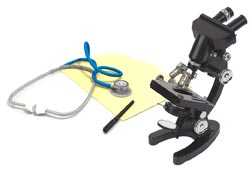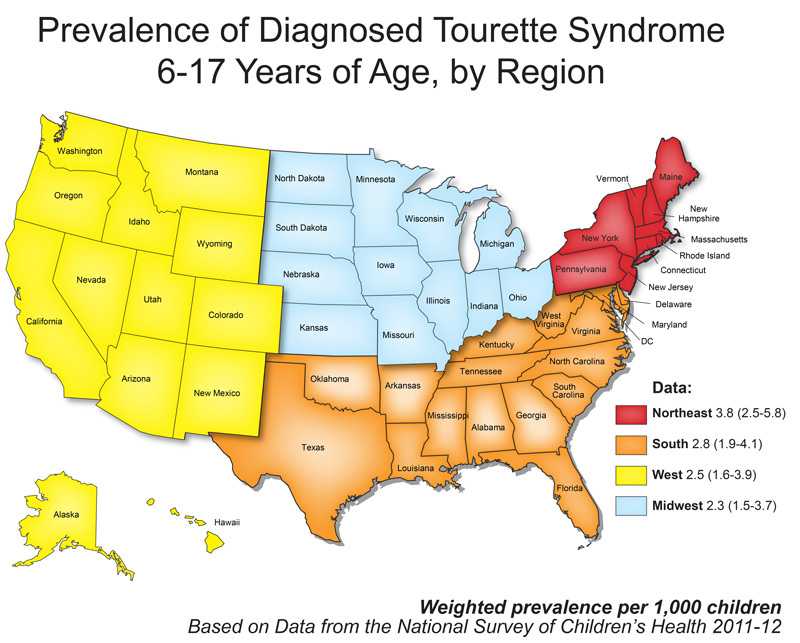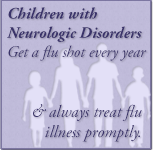Research

The Centers for Disease Control and Prevention (CDC) works with partners to conduct research to better understand Tourette Syndrome (TS), including the prevalence of TS, the quality of life among people affected by TS, risk and protective factors associated with the impact of TS, and health risk behaviors associated with TS. Results from this research are used to better inform public health efforts to improve the lives and health outcomes of people affected by TS, to implement education programs to help improve the quality of life of those with TS and their families, and to inform future research.
CDC conducts research to:
- Find out how many people have TS and the characteristics of people with TS.
- Determine the impact of TS on individuals; families; and communities, including schools.
Bridging the Gap between Public Health and Tourette Syndrome
The National Center on Birth Defects and Developmental Disabilities is working to improve the systematic understanding of TS, and the health and well-being of people affected by TS. The approach is based a summary report on TS that highlights gaps in knowledge and resources that can be addressed by public health. The report was informed by a literature review and expert panel, and describes public health activities that are needed.
Read Bridging the Gap between Public Health and Tourette Syndrome »
Prevalence and Characteristics of TS
It is important to know how many people have TS (prevalence). The CDC is using data from national surveys to understand the impact of TS on individuals and their families. By studying the number of people diagnosed with TS and other tic disorders over time, we can determine whether the number is rising, dropping, or staying the same. We also can compare the number of people with TS across different areas of the country and among different groups of people. This information can help identify causes of TS and help communities plan for services.
Understanding the characteristics of people with TS helps researchers at CDC to better identify groups of people who might be at greater risk for TS, as well as groups who might be less likely to be diagnosed with TS. This information helps researchers at CDC focus future research and outreach activities.
Click here to view the prevalence for your region.

Following are activities that CDC conducts or funds in order to learn more about the number of people with TS:

National Survey of Children’s Health
CDC conducts a nationally representative survey that provides data on health conditions among children in the United States, called the National Survey of Children’s Health. Information on TS was collected for the first time in 2007-08, and again in 2011-12.
In that survey, parents were asked if their child had ever been diagnosed with TS, whether or not their child currently had TS, and about the severity of TS. This allowed us to calculate prevalence estimate of diagnosed TS based on a nationally representative sample, as well as information about the prevalence of co-occurring conditions and characteristics of children who had been diagnosed with TS. Additional analyses of this survey are ongoing.
The data showed that approximately 1 out of every 360 children 6 through 17 years of age in the United States had been diagnosed with TS; this represented about 138,000 children. [Read article on 2007-08 data] [Read summary of 2011-12 data]
Impact of Tourette Syndrome – Research Study
CDC conducted a study to increase understanding about tic disorders and their impact on families and communities in collaboration with the University of Rochester and the University of South Florida. Read about the study design and research methods.
Overview of Other Research Activities
CDC is:
- Funding four sites as part of the Project to Learn about Youth – Mental Health, a community study looking at how frequently certain mental, behavioral, emotional, and tic disorders occur in school-aged children and how those disorders are treated.
- Funding the development of a screening tool to improve the early identification of children with tics.
- Funding an update of the Diagnostic Interview Schedule for Children to use as an accurate diagnostic interview for mental, emotional, and behavioral disorders including TS.
- Leading research to better understand symptom onset, diagnostic process and timing, and treatment of TS using data from the National Survey of the Diagnosis and Treatment of ADHD and Tourette Syndrome (NS-DATA), a follow-up survey of families who participated in the 2011-2012 National Survey of Children’s Health.
For More Information
For information on clinical trials and TS
Tourette Association of America supported research
Scientific Articles and Key Findings
A National Profile of Tourette Syndrome, 2011-2012
(Published: July 11, 2014)
Tourette Syndrome and Parenting Aggravation
Learn about how having a child with Tourette Syndrome can affect families
(Published: July 11. 2014)
Health Care Needs of Children with Tourette Syndrome
Children with TS experience greater health care needs and face challenges receiving coordinated care
(Published: July 11, 2014 )
Tourette Syndrome: Everyone Can Play a Role
Learn how everyone, including CDC, can play a role to improve the lives of people with Tourette syndrome.
(Published: June 1, 2015)
10 Years of Tourette Syndrome Education and Research
Learn about CDC’s decade of work doing research and educating the public on Tourette Syndrome.
(Published: June 2, 2014)
Tourette Syndrome: New Treatment Option
Learn about a new treatment option and find out what CDC is doing to raise awareness and educate health and education professionals about Tourette Syndrome.
(Published: June 3, 2013)
Scientific Articles
* These CDC scientific articles are listed in order of date published
When you click "Read Summary"
The link will take you to a short summary of the article. The full article is available to subscribers of the publication's service.
Design of a Multi-Site Study Assessing the Impact of Tic Disorders on Individuals, Families, and Communities.
Pediatric Neurology, online ahead of print: 8 November 2016
Erika F. Augustine, Heather R. Adams, Rebecca H. Bitsko, Edwin van Wijngaarden, Angelika H. Claussen, Alyssa Thatcher, Camille E. Hanks, Adam B. Lewin, Thomas G. O’Connor, Amy Vierhile, Melissa L. Danielson, Roger Kurlan, Tanya K. Murphy, Jonathan W. Mink
[Read article]
Suicidal thoughts and behaviors in children and adolescents with chronic tic disorders.
Depression and Anxiety. 2015; 32(10), 744–753.
Eric A. Storch Ph.D., Camille E. Hanks, Jonathan W. Mink, Joseph F. McGuire, Heather R. Adams, Erika F. Augustine, Amy Vierhile, Alyssa Thatcher, Rebecca H. Bitsko, Adam B. Lewin, Tanya K. Murphy
[Read summary]
Utility of the Diagnostic Interview Schedule for Children for Assessing Tourette Syndrome in Children
Journal of Child and Adolescent Psychopharmacology. 2014; 24(5), 275-284.
Adam B. Lewin, Jonathan W. Mink, Rebecca H. Bitsko, Joseph R. Holbrook, E. Carla Parker-Athill, Camille Hanks, Eric A. Storch, Erika F. Augustine, Heather R. Adams, Amy E.Vierhile, Alyssa R. Thatcher, and Tanya K. Murphy.
[Read article]
All Articles
Search a database of articles that have been published by CDC authors within the National Center on Birth Defects and Developmental Disabilities from 1990 to present.
- Page last reviewed: December 5, 2016
- Page last updated: December 5, 2016
- Content source:



 ShareCompartir
ShareCompartir